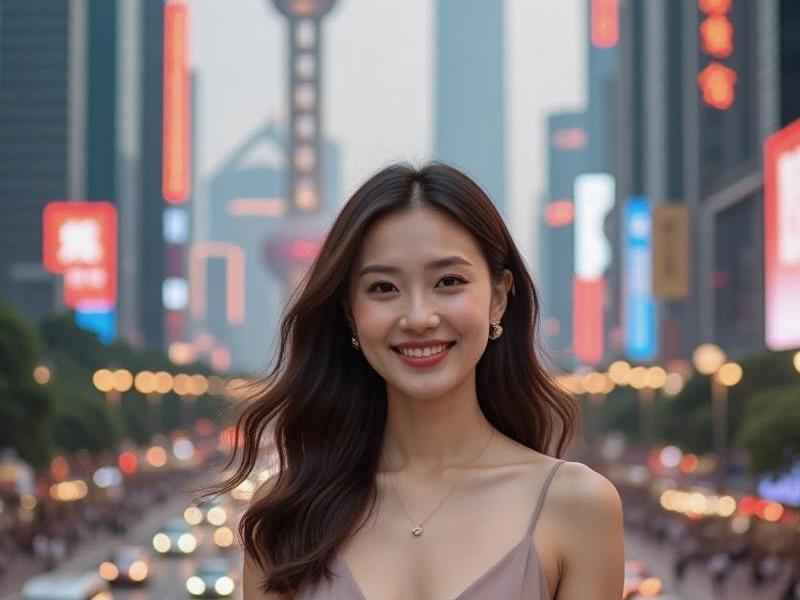The Shanghai Woman: Redefining Modern Femininity in China's Global Metropolis
⏱ 2025-06-20 00:31 🔖 爱上海同城论坛
📢0℃

In the neon-lit corridors of Shanghai's financial district and the art-filled lanes of the French Concession, a quiet revolution is unfolding. The women of China's most cosmopolitan city are rewriting the rules of what it means to be feminine in modern Asia.
The Professional Pioneers
Shanghai boasts China's highest percentage of female executives in Fortune 500 companies (38%, compared to the national average of 22%). Women like Zhou Xiaoping, a 32-year-old investment director at a major hedge fund, represent this new breed. "My grandmother was a factory worker, my mother a schoolteacher," Zhou says between meetings. "My generation doesn't accept glass ceilings."
The city's unique history as an international port has created a culture where female ambition isn't just tolerated but celebrated. Nearly 65% of Shanghai startups have at least one female co-founder, according to 2024 municipal data.
上海龙凤千花1314
Fashion as Cultural Statement
Shanghai's streets serve as runways where tradition meets cutting-edge. The "qipao revival" movement sees young professionals pairing modernized versions of the traditional dress with designer sneakers. Local fashion influencer Li Jia explains: "We're not rejecting Chinese heritage - we're remixing it on our own terms."
Beauty standards here reflect global influences with local twists. The "Shanghai Brow" - a softer, more natural arch compared to the sharply angled brows popular in Beijing - has become a nationwide trend. Cosmetic surgery clinics report 40% of clients now request subtle enhancements rather than dramatic transformations.
上海私人品茶
The Work-Life Balance Equation
Unlike the "996" culture (9am-9pm, 6 days a week) prevalent in other Chinese tech hubs, Shanghai women are pioneering alternative models. Co-working spaces with childcare facilities and "no overtime Thursdays" initiatives are gaining traction. "We want careers, but not at the cost of everything else," says entrepreneur Wang Lili.
Cultural custodians and change-makers
爱上海 Beyond corporate success, Shanghai women are driving cultural innovation. Museum director Xu Ming curates exhibitions blending traditional Chinese art with digital installations. "We're creating new ways to engage with our history," she notes, standing beside an AI-rendered version of a Song Dynasty landscape.
Challenges Remain
Despite progress, tensions persist. The term "shengnü" ("leftover women") still haunts singles over 27. Fertility rates remain low as many delay marriage for careers. Yet the municipal government's recent "Women-Friendly City" initiative, which includes subsidized egg-freezing and stricter anti-discrimination laws, shows Shanghai's commitment to supporting women's choices.
As China navigates its complex gender landscape, all eyes are on Shanghai's women - the vanguard of a new Chinese femininity that's professional, stylish, and unapologetically ambitious. Their choices today may well shape the roles available to the next generation of women across Asia.
Shanghai 2040: The Vertical City Revolution Redefining Urban Living"Neo-Cheongsam Revolution: Shanghai's Tech-Infused Femininity Reshaping Global Beauty Norms"The Shanghai Woman Phenomenon: How China's Most Cosmopolitan Women Are Shaping Global Perceptions of Chinese Femininity【城市镜像】从石库门到陆家嘴:上海女性的十二时辰Shanghai 2040: Building the Sustainable Megacity of TomorrowThe Cultural Awakening: How Shanghai is Redefining China's Creative EconomyThe Yangtze River Delta Megaregion: How Shanghai and Its Neighbors Are Creating China's Most Dynamic Economic Zone【城市肖像】上海女性的千面风华:从弄堂旗袍到数字游民"Circuitboard Qipao: How Shanghai's Women Are Programming Tomorrow's Beauty Standards"Neon Renaissance: How Shanghai's Entertainment Clubs Are Writing the Future of Urban Nightlife
【水岸重生录】苏州河下游的沪苏双城实验【夜上海浮世绘】"百乐门"传奇:探秘民国第一舞厅的世纪沉浮【流金岁月】上海名媛的世纪审美革命【时代镜像】上海女子的千面风华:从月份牌美人到数字缪斯的百年嬗变"的格式要求
- 标题、关键词、描述、内容四部分缺一不可
- 内容要体现新闻专业性
- 需要包含上海及周边元素
- 文章要有深度和可读性
3. 注意事项:
- 避免生成调查报告
- 保持新闻的客观性和专业性
- 可以适当融入历史元素
- 确保内容真实可信
- 从文化、社会、经济等角度切入
- 注意上海与周边区域的联动关系
以下是为您准备的上海及周边主题深度报道:【城市记忆】亭子间与智慧社区:一个国际大都市的市井基因解码【摩登密码】从月份牌到元宇宙:上海女性的百年形象进化论【夜上海进化论】从百乐门到量子酒吧:解码都市夜生活的文化基因【大上海都市圈进行时】2025沪苏浙皖同城化生活全景图【魔都密码】从外滩到元宇宙:解码上海城市基因的五重奏

